Cockatiels are famous and beloved pet birds that can live up to 20 years or more with proper care. However, like humans, cockatiels can also suffer from obesity and related health problems if fed an improper diet or do not exercise enough.
In this article, we will discuss how to tell if your cockatiel is overweight, the causes and consequences of obesity in cockatiels, and how to help your cockatiel lose weight and stay healthy.
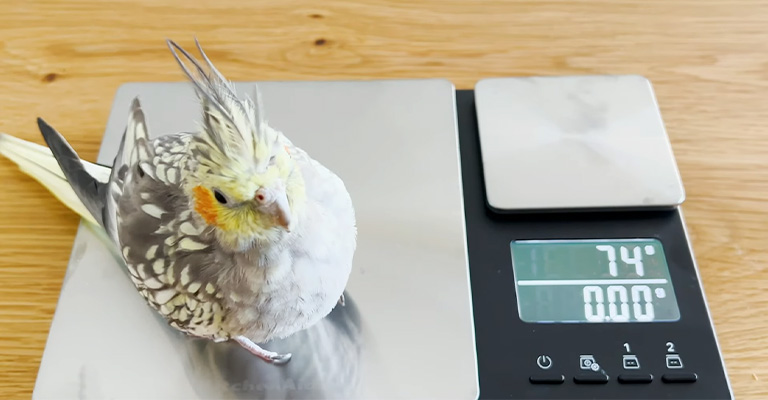
How To Tell If Your Cockatiel Is Overweight?
Determining if your cockatiel is overweight requires careful observation and assessment. While their feathers can make it challenging to gauge their body shape, there are several signs to watch for. Additionally, weighing your cockatiel regularly and assessing its keel bone can provide valuable insights into its weight and body condition.
Some signs that may indicate your cockatiel is carrying excess fat include:
Visual Assessment
- Examine the overall body shape of your cockatiel. A healthy cockatiel should have a sleek and streamlined appearance.
- Look for excessive fat deposits around the chest, abdomen, and vent area.
- If your cockatiel appears round or chubby rather than lean, it may indicate overweight.
Weighing
- Regularly weigh your cockatiel using a digital scale designed for small animals.
- Establish a baseline weight for your bird when it is in a healthy condition.
- Monitor weight fluctuations and compare them to the baseline. A significant increase in weight may indicate obesity.
Breastbone Assessment
- Gently feel the breastbone of your cockatiel, located in the center of its chest.
- In a healthy cockatiel, the breastbone should be easily felt, with a thin layer of muscle and tissue covering it.
- If the breastbone is difficult to feel or is surrounded by excessive padding, it may suggest an overweight condition.
Wing Fat Pads
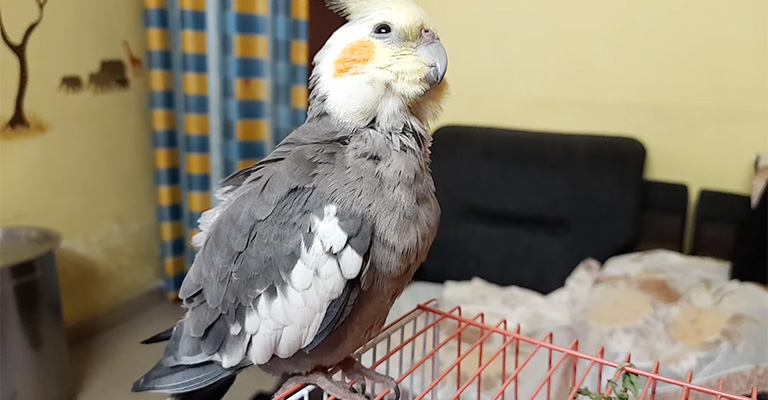
- Check for fat deposits on the upper surface of your cockatiel’s wings, known as wing fat pads.
- Gently run your fingers along the wing area, feeling for any thickened areas or soft pads.
- If there is a noticeable amount of fat or padding on the wings, it can be a sign of being overweight.
Difficulty in Flight
- Observe your cockatiel’s flight capability and agility.
- If your bird shows signs of struggling to fly or has reduced flight endurance, it may indicate excess weight affecting its mobility.
Lack of Exercise:
- Evaluate the amount of physical activity and exercise your cockatiel engages in daily.
- A sedentary lifestyle and lack of exercise can contribute to weight gain.
- If your cockatiel spends most of its time perched or shows reluctance to engage in physical activities, it may be prone to becoming overweight.
Behavior and Breathing:
- Monitor your cockatiel’s behavior and breathing patterns.
- Overweight cockatiels may show signs of lethargy, decreased activity levels, and reduced interest in playing or exploring.
- They may also exhibit heavy or labored breathing due to excess weight putting strain on their respiratory system.
What Are The Causes And Consequences Of Obesity In Cockatiels?
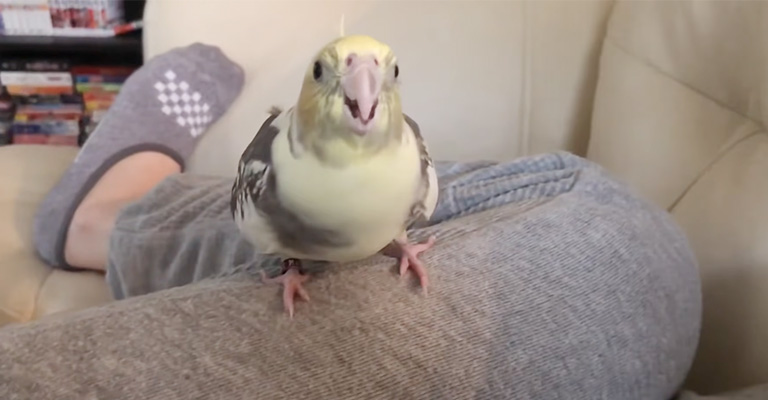
Obesity in cockatiels can stem from various factors, including diet, lack of exercise, overfeeding, and underlying health conditions. Understanding the causes and consequences of obesity is crucial for managing and preventing this condition in cockatiels.
Causes of Obesity in Cockatiels-
Inappropriate Diet
Feeding cockatiels a diet high in fatty seeds, nuts, or sugary treats can contribute to weight gain. Such foods are calorie-dense and lack essential nutrients, leading to excessive energy intake.
Overfeeding
Providing more significant food portions or frequent treats beyond the bird’s nutritional needs can result in weight gain. Cockatiels may also consume excessive amounts of food if it is readily available in their environment.
Lack of Exercise
Insufficient physical activity and limited opportunities for exercise can contribute to weight gain. Cockatiels that spend most of their time confined to a small cage or have minimal options for flying and movement are at a higher risk of obesity.
Health Conditions
CSpecificunderlying health issues, such as hormonal imbalances, metabolic disorders, or thyroid or liver diseases, can predispose cockatiels to obesity.
Consequences of Obesity in Cockatiels-
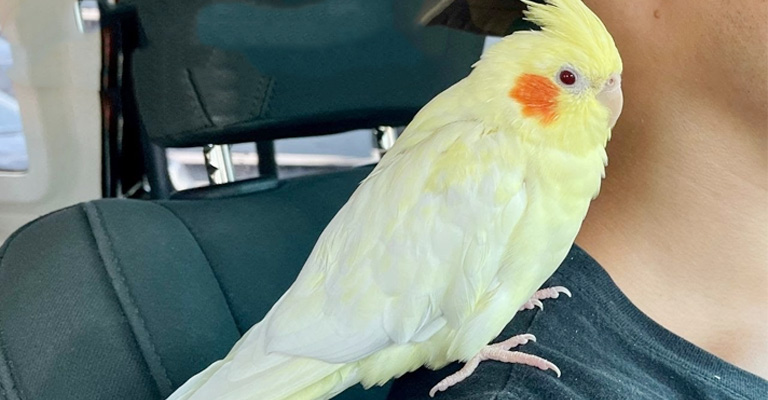
Reduced Lifespan
Obesity can shorten a cockatiel’s lifespan. Excess weight strains the cardiovascular system and organs, increasing the risk of heart disease, liver problems, and other health complications.
Decreased Mobility
Overweight cockatiels may experience difficulties flying, climbing, or perching due to the excess weight burdening their joints and muscles. This can result in reduced physical activity and a sedentary lifestyle.
Respiratory Issues
Fat accumulation around the chest area can restrict the movement of the respiratory system, leading to breathing difficulties and wheezing.
Increased Susceptibility to Diseases
Obesity weakens the immune system, making cockatiels more susceptible to infections, respiratory ailments, and other illnesses. The compromised immune function can also hinder their ability to recover from diseases.
Feather and Skin Problems
Overweight cockatiels may struggle with grooming, leading to feather plucking, soiled feathers, and skin irritations. These conditions can further contribute to stress and discomfort.
Digestive Disorders
Obesity can increase the risk of digestive issues in cockatiels, such as fatty liver disease, as their bodies struggle to process excess fat.
Managing and preventing obesity in cockatiels requires a balanced diet, appropriate portion control, regular exercise, and veterinary monitoring. A healthy lifestyle, including a nutritious diet and ample opportunities for physical activity, is crucial for maintaining an ideal weight and overall well-being in cockatiels.
How to Help Your Cockatiel Lose Weight and Stay Healthy?
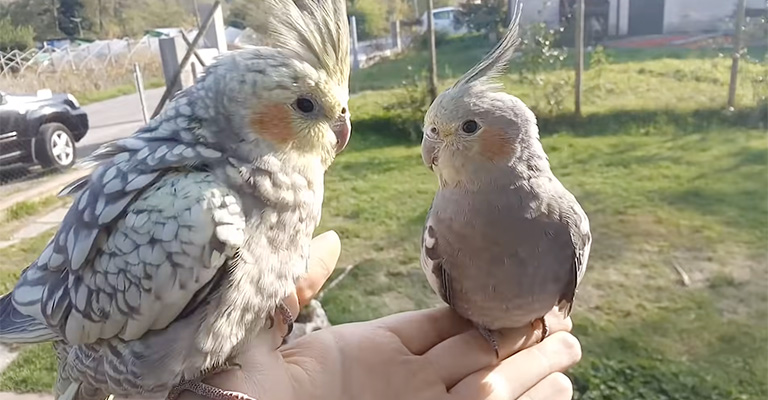
If your cockatiel is overweight, taking proactive steps to help them shed excess weight and maintain a healthy body is essential. Here are some guidelines to assist your cockatiel in losing weight and promoting overall health:
Consult with an Avian Veterinarian
Schedule a visit with an avian veterinarian to rule out any underlying health conditions contributing to weight gain. They can provide personalized guidance and recommendations tailored to your cockatiel’s needs.
Adjust the Diet
Evaluate your cockatiel’s diet and make necessary adjustments. Replace calorie-dense seeds and fatty treats with nutritious options such as fresh vegetables, limited fruits, and high-quality pellets. Ensure a balanced diet that meets their nutritional requirements while promoting weight loss.
Portion Control
Monitor the portion sizes to prevent overfeeding. Follow the guidelines provided by your avian veterinarian regarding the appropriate amount of food for your cockatiel’s size and activity level. Avoid leaving food out continuously and establish set mealtimes.
Treat Selection
Minimize or eliminate fatty and sugary treats from your cockatiel’s diet. Instead, offer healthier alternatives like small pieces of vegetables or low-calorie fruits as occasional rewards.
Increase Exercise Opportunities
Provide ample opportunities for physical activity. Offer a variety of toys, perches, and climbing structures to encourage movement and exercise. Allow supervised out-of-cage time for your cockatiel to explore, fly, and stretch their wings.
Interactive Playtime
Engage in interactive play sessions with your cockatiel to encourage movement and mental stimulation. Use toys or games that involve flying, chasing, or problem-solving to keep them active and entertained.
Regular Weighing
Monitor your cockatiel’s weight by regularly weighing them using a digital scale. Keep track of their progress and adjust their diet and exercise routine accordingly. Even small weight losses can have a positive impact on their health.
Environmental Enrichment
Create a stimulating environment for your cockatiel. Provide toys, puzzles, and foraging opportunities to keep them mentally engaged and prevent boredom-related overeating.
Veterinary Check-ups
Schedule regular check-ups with an avian veterinarian to monitor your cockatiel’s weight, overall health, and progress in weight loss. They can provide ongoing guidance and support throughout the process.
Remember, weight loss in cockatiels should be gradual and steady. Rapid weight loss can be detrimental to their health. Patience, consistency, and a holistic approach will help your cockatiel achieve a healthier weight and maintain their well-being in the long term.
FAQs
Overweight cockatiels can experience various health issues like heart problems, liver disease, joint pain, and a weakened immune system. Reducing their fat can help prevent these health complications and improve their overall well-being and lifespan.
You can assess your cockatiel’s weight by gently feeling its breastbone. If you can’t handle the bone or if a layer of fat covers it, your cockatiel may be overweight. An excessively round or bulging appearance and difficulty moving or flying are signs of potential overweight.
If your cockatiel is overweight, consult an avian veterinarian to rule out any underlying health issues and receive guidance tailored to your bird’s needs. The vet may recommend adjusting the diet, increasing exercise opportunities, and monitoring weight loss progress.
To assist your cockatiel in losing weight, ensure they are consuming a balanced, species-appropriate diet. Offer a variety of fresh vegetables, limited amounts of fruits, and high-quality pellets. Minimize fatty and sugary treats, seeds, and excessive portion sizes. It’s crucial to consult with an avian veterinarian for personalized dietary recommendations.
Providing opportunities for physical activity is essential. Offer plenty of toys and perches that encourage climbing, swinging, and foraging. Allow your cockatiel supervised out-of-cage time to fly or explore a safe environment. Additionally, engaging in interactive play sessions with your bird can encourage movement and exercise.
Conclusion
Helping your overweight cockatiel shed excess fat is crucial for their health and well-being. Consulting with an avian veterinarian is essential to develop a tailored plan for weight loss through dietary adjustments, increased exercise, and monitoring progress.
Taking proactive steps can improve your cockatiel’s overall health and ensure a happier, more active life for your feathered friend.